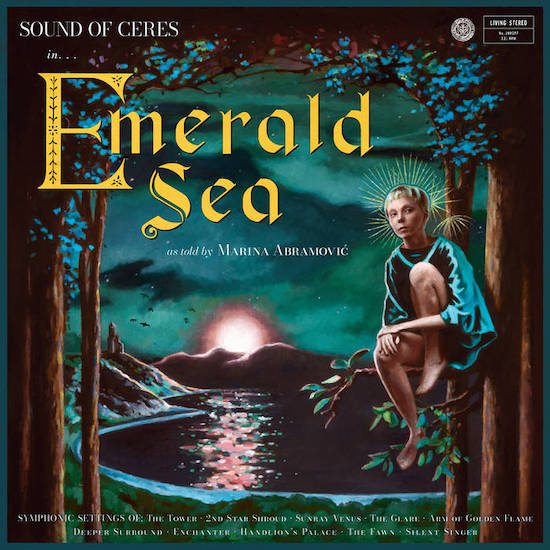The album’s first words are both simple and all-consuming: “I am the Universe”. Voiced with a presence and an assertiveness (what else, if you happen to be the universe) that only performance artist Marina Abramović seems capable of, with her radiating personality and dark, Serbian-accented voice. No surprise then (or not?) that Abramović is, in fact, lending her voice to the Universe on Sound of Ceres’ new album Emerald Sea. A galactic, complex concept album set in three acts that tells the story of the Universe finding itself by finding Venus. Listeners follow the two deities as they trail each other through “the furthest reaches of experience,” as the band word it in the accompanying notes.
The words “I am the Universe” in the opening track ‘The Tower’, are followed by the onset of bombastic orchestral music. Expansive, both dark and light, peaceful and dramatic. However, most of the ten tracks on the album are dedicated to Venus, sung by Sound of Ceres lead singer, K Hover, in her signature eeriely, airy sweet voice. Emerald Sea is a departure from the heavy synth compositions on The Twin (2017). Orchestral instruments and arrangements have taken over, creating a theatrical sound that incorporates elements of the bands signature dream pop, 60s pop and early twentieth-century European orchestral music. The band states Ravel’s ballet Daphnis et Chloé and Gustav Holst’s The Planets as their inspirations. There is a good portion of Shostakovich in there as well.
The album is an ambitious undertaking and is quite a lot to deal with. The mythical story of the two deities, their different voices and sounds, the overall bombastic music and Marina Abramović herself, who, whether you like it or not, does not come without her artist personality. The accompanying album notes are perhaps intended to guide listeners through all this, but at the same time limit the listening experience – do I still do justice to the artists’’ intentions if I find the Universe-Venus-narration too abstract? Despite the high quality of the arrangements, the orchestration and the recording as a whole, it is a bit too much at once. A case of less would have been more.


